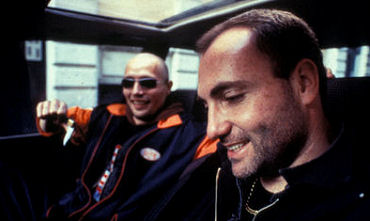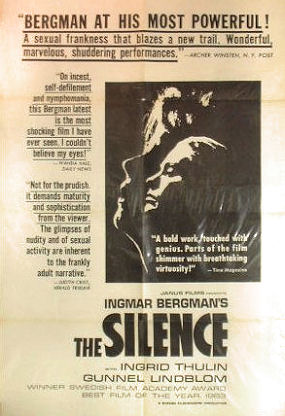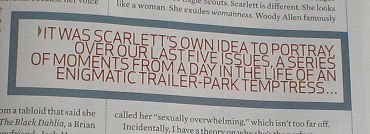“When the romantic comedy When Harry Met Sally was released in July 1989, it made just $1.1 million during its opening weekend,” writes N.Y. Times staffer Laura Holson. “But Alan F. Horn, whose film company produced the movie, was confident that, given time, it could be a hit. He was right. The movie earned $93 million at the domestic box office that summer. ‘If it was today, the headline in Variety would have been When Harry Met Disaster,’ Mr. Horn said in an interview. ‘They would have killed us after that first weekend and I don√ɬ¢√¢‚Äö¬¨√¢‚Äû¬¢t think we would have had a chance to build that movie. In today√ɬ¢√¢‚Äö¬¨√¢‚Äû¬¢s climate it wouldn√ɬ¢√¢‚Äö¬¨√¢‚Äû¬¢t have had a chance to breathe.'”
Day: October 8, 2006
Wowser Drug Trilogy
Neil Armfield‘s Candy (ThinkFilm, 11.27), which I saw last month in Toronto, is an Australian-made drama about a young couple (Heath Ledger, Abbie Cornish) hooked on heroin and, to a lesser extent, each other. The fact that it’s mostly plays like a cautionary tale about drug addiction begs a question. Has there ever been a movie about drug users enjoying satisfaction and serenity?

In the best-respected movies about drugs and druggies (Last Days, Requiem for a Dream, Panic in Needle Park, Drugstore Cowboy, Last Train to Brooklyn, The Basketball Diaries), controlled substances always enslave. They rule over values, dignity, common sense, decency — they degrade everything and everyone all to hell. Addicts are criminals, animals, degenerates…and sooner or later they end up screaming in some overlit space — a hallway, an operating room, a police precinct — at some godawful hour.
Cautionary tales, hell — they’re horror movies of a sort. Nobody’s just chipping and everyone’s a victim. Get into it yourself and you’ll be next, see? The only one that doesn’t quite say this is Drugstore Cowboy, but only because it’s in-and-out funny during the first hour.
I’m mentioning all this as a preamble because the reigning Big Kahuna of drug-addict movies is going to pop through theatrically in Los Angeles in early November, and obviously down the road on DVD. It’s not just the longest by virtue of being a three-parter, but is clearly one of the best. Meaning it’s one of the most ghastly and grimly believable.
I’m speaking of Nicolas Winding Refn‘s The Pusher Trilogy (Magnolia), which was first shown on this continent at the 2005 Toronto Film Festival. In its entirety, I mean. And it’s a very high quality ride.
The three Copenhagen-based film were made and released over a span of nine or ten years — the low-budget Pusher in ’96, and the more amply fundedPusher II : With Blood on My Hands and Pusher 3: I’m the Angel of Death in ’04 and ’05, respectively.

It took me a while to finally sit down and watch all three but I was very glad after I did. And I don’t have a favorite installment. They’re all part of a thematic piece that basically says the same thing over and over: if you want to surround yourself with totally unreliable low-lifes who will betray you or fuck you up at the drop of a hat, become a drug user or supplier. Thing is, they’re completely convincing in a verite sense. Nothing feels acted or staged — it’s all completely raw and real-feeling.
Pusher is about a small time dealer Frank (Kim Bodnia) whose life becomes more and more hellish and precarious after he’s burned by a supplier (or is it a buyer? I’ve forgotten) and the vise he’s stuck in gets tighter and tighter..
Pusher 2 is about a totally wretched scumbag named Tonny (Mads Mikkelsen, the villain in the upcoming 007 film Casino Royale) who’s just gotten out of the slammer and trying to get his chaotic life into shape. Sure thing. He’s despised by his druglord dad and most of his family, and discovers also that he’s just become a father. Great. Rarely has the big screen been sullied by such an unmitigated lowlife.
Pusher 3 is about a Copenhagen ganglord Milo (Zlatko Buric) dealing with drug-selling comepetitors as he plans festivities for his daughter’s 25th birthday. A description of this film on theUK DVD box says that “the stress of Milo’s day only serves to emphasise the bleak nature of criminal existance.” Bleak? Milo and a hecnhman wind up having to butcher a guy they’ve killed — chop him up and grind him down like hamburger.

Magnolia Pictures began releasing The Pusher Trilogy in theatres last summer. I don’t know what the DVD plans are, but I’m guessing some kind of ear;y ’07 release.
The Magnolia website says it’s currently playing in Cleveland, Ohio. It will open in Huntington, N.Y. on 10.11, Chicago on 10.20, and in Cambridge’s Brattle Theatre on 11.3 along with the L.A. opening.
Bend beckons
Oregonian critic Shawn Levy delivers on that stand-alone piece about the Bend Film Festival, which kicks off four days from now. As a juror I’ve watched about 20 features and docs plus eight or nine shorts on DVD so far, and I’m still not entirely done. The experience has only reenforced my belief that 90% of everything is crap. Which isn’t “my “belief at all — it’s a famous quote from science-fiction writer Theodore Sturgeon. Okay, let’s re-phrase for sensitivity’s sake: 90% of everything isn’t quite good enough.
Esquire tease
That “Sexist Woman Alive” tease over the last five issues of Esquire, consisting of staffer A.J. Jacobs interviewing “an enigmatic trailer-park temptress” who turned out to be Scarlett Johansson, was one of the boring and infuriating wank-offs in monthly magazine history. I got more and more angry with each new installment, and now that it’s over I feel like throwing the latest issue across the room.
Esquire did the same thing last year with Jessica Biel, fine. Jacobs gives credit to Johansson for coming up with the idea of her portraying a trailer trash girl…brilliant. I hated this idea, hated this idea…hated it. On top of which Johansson has always seemed a tiny bit common. Nothing wrong with obviousness but commonality — i.e, indications of serfs and peons in the family tree — has a way of dimming the candle.
Shortbus shortcomings
“I’m not saying John Cameron Mitchell‘s Shortbus is up there with Citizen Kane or Drunken Master II,” says Richard Corliss in a Time essay called “Meet the F–kers.” “It’s mostly clever, sometimes meandering. And I have to say I didn’t get all that jazzed by the many gay exertions (or the straight ones).”
Really? I thought the sequence with Paul Dawson leaning upside down against a wall and blowing himself was right up there with the Odessa Steps sequence in Sergei Eisenstein‘s Battleship Potemkin.

“But I was, critically speaking, excited to see the coherent integration of explicit sex scenes into a naturalistic story film,” Corliss continues. “Mitchell said that in press interviews here, he was asked over and over, ‘Why sex?’ I wonder: What took so long? Most people laugh and cry; most people have sex, occasionally at the same time. Sex isn’t divorced from our own emotional biographies; it’s an inextricable part of it.
“So I applaud Mitchell. And I say to other intrepid filmmakers: Just do it.” — critic Richard Corliss in his 10.6.06 Time piece called “Meet The F–kers.”

I respect Shortbus also for blending tangible emotional fibre with downtown Manhattan sexuality and hormonal urgency, blah, blah, and I too wish there would be more sexuality and less overt violence in movies, etc. And I laughed at the singing menage a trois scene. But the truth is that I was bored — vaguely bored — during a lot of Shortbus, and moderately repelled by some of the sexual footage.
Repelled partly because of Mitchell’s dp, Frank G. DeMarco, using overly bright lighting on all that white blotchy skin, and partly because I miss the kind of sugggestive, carefully lit scenes of skin and out-front sexuality that were part of Hiroshima Mon Amour , the 1959 Alan Resnias film, and Ingmar Bergman‘s 1963 film The Silence.
I know, I know…get with Mitchell and DeMarco’s blotchy white skin program and get in step with the 2006 program. But I don’t want to live in a cinematic world of shrugs, yawns and popcorn and leg-stretching breaks in the lobby .

Another “Departed” view
“I saw The Departed last night,” an industry friend wrote this morning. “I recognize the awesomeness of the filmmaking, of course. But I agree with you that it really is about nothing at all. It’s a film without a soul. And the praise it’s gotten makes me wonder how much the aura of a director influences critics. Sometimes it helps and sometimes it hurts.
“Allegiance factors are a big factor with Clint Eastwood these days also. Million Dollar Baby was a lazily directed film. It was all in the screenplay. Casino was not well reviewed, but had it been directed by an unknown, it would have been hailed, perhaps even an Oscar winner.
“On the reverse there’s so much love for Martin Scorsese now. A lot of the fervor for The Departed is actually a celebration of a good-old-days feeling…the Marty they knew and loved many years ago back in the fold. Allegiance factors are a big factor with Eastwood these days also. Million Dollar Baby was a lazily directed film. It was all in the screenplay.”
Clarifying: I didn’t say it’s “about nothing at all” in my original review. I wrote that The Departed “doesn’t exactly throb with thematic weight. It may not be profound or symphonic, but it’s cause for real cheering. Is it as good as Goodfellas? Well, no…but who cares? It’s tight and trim and exciting at every turn. And at least it’s Scorsese back in the groove.”
Here comes Mel
Next Thursday and Friday morning (10.12 and 10.13) Mel Gibson will grovel before Diane Sawyer on ABC’s Good Morning, America about his anti-Semitic blurtings when he was arrested for that DUI last summer. The idea, of course, is to pave the way for Apocalypto (Touchstone, 12.8) by at least starting to try and mitigate some of the disdain that the Hollywood community feels for him.
Bening on Deirdre
“In Running With Scissors, which is based on Augusten Burroughs‘s best-selling memoir about his crazy, destructive upbringing, Annette Bening portrays Burroughs’s mother, a would-be poet who is addicted to pills that have been prescribed by her psychiatrist. Under the sway of narcotics and convinced that her greatness will be realized only if she is on her own, Deirdre allows the psychiatrist to legally adopt her only child, young Augusten.
“Despite the extreme loopiness of this woman, Bening manages to make her understandable and sympathetic — she is a fascinating mess, a strangely driven and complicated diva without any particular talent. ‘Deirdre’s aspirations are true for all of us,’ Bening explained. ‘Sometimes the aspiration is just as passionate as the result. The dream can overtake everything.'” — from Lynn Hirschberg‘s profile of Bening in Sunday’s N.Y. Times (10.8).
Dusty stage
It’s nearly time to start getting into Clint Eastwood‘s Flags of Our Fathers, but before it all starts here’s a musical hint about a thematic predecessor. No need to make a big deal out of it. Just something to consider and maybe chew on.


